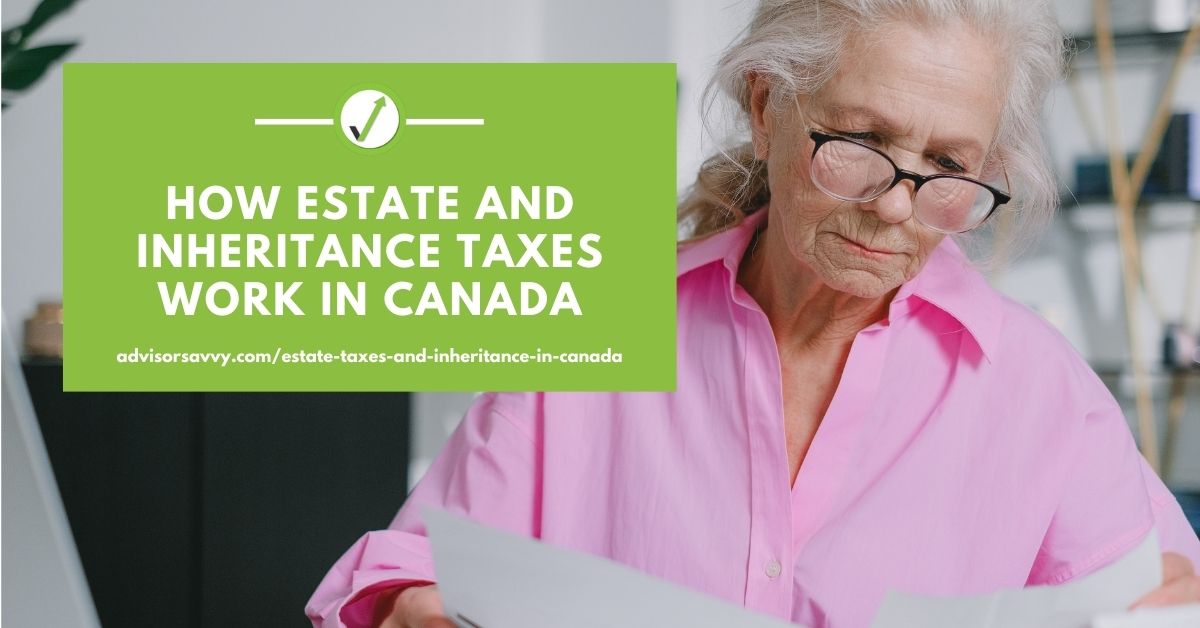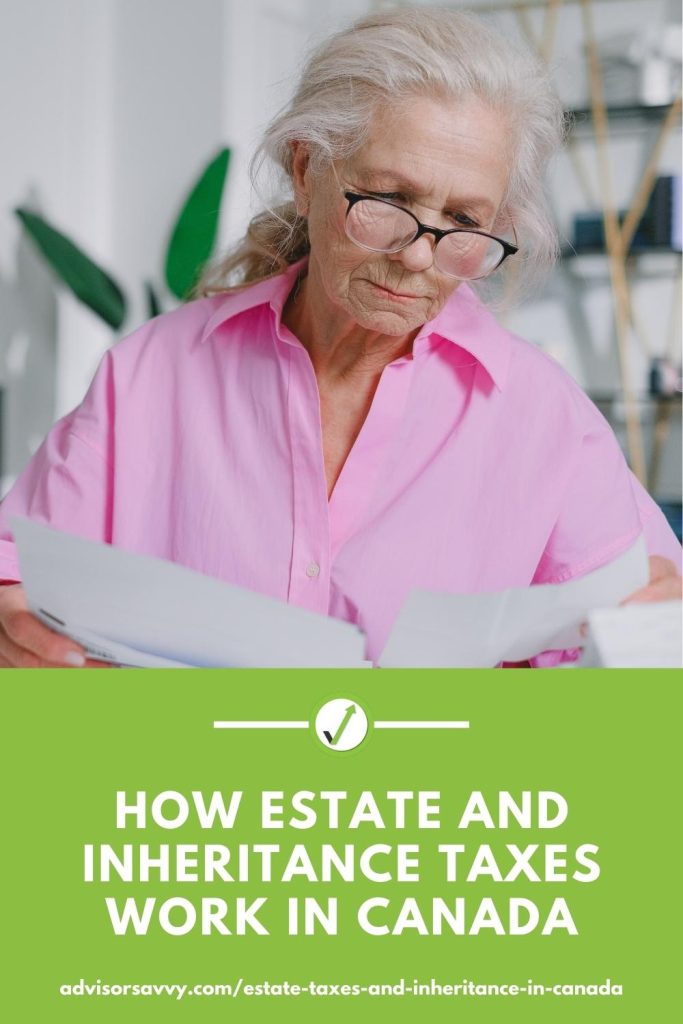
Part of getting older is planning what will happen to your estate when you pass away. Most people want to ensure their loved ones do not have to deal with a financial burden upon death. After all, grieving is a difficult enough process on its own. You may be wondering if there is an inheritance tax in Canada. In short, there is no specific inheritance tax in Canada, but taxes on an estate may still be applicable when you pass on. If you’re on the receiving end of an inheritance, you may also be curious about the effect on your personal taxes. So, let’s answer some of your biggest questions about how estate taxes and inheritance works in Canada.

Table of contents
What is an estate?
An estate is an individual’s collection of assets at the time of death. For example, this could include savings, real estate, artwork, or any other asset of value. These assets are distributed according to the person’s will. However, not every person has a will. In this case, distribution is determined by law.
Related Reading: Estate Planning Checklist for Canadians

Match to your perfect advisor now.
Getting started is easy, fast and free.
What is estate tax?
Estate tax is the taxation of the money and assets of an individual who recently passed away. How is an estate tax administered? It depends on the person’s residency, the size of their estate, and their will. Canadian estate tax laws instruct inheritances to be taxed in the hands of the deceased first through an estate tax filing. After that, the funds are distributed to the beneficiaries.
Related Reading: Estate Planning Made Easy: Willful.co Review
Is there an estate or inheritance tax in Canada?
There is no estate tax or inheritance tax in Canada. However, taxation may occur during the process of transferring and distributing an estate or inheritance. More specifically, income tax, capital gains, and other taxes may apply. Before a deceased person’s estate is distributed, a final tax return must be filed and the bill paid. If you’re the entity receiving all or part of an estate, you would not have to pay taxes on the received money or assets.
Related Reading: Tax Season In Canada: What You Should Know
How are estates taxed in Canada?
The main estate tax in Canada is related to the transfer of assets. For instance, if the deceased individual owned a home, tax would come into play to transfer the property to a living individual. Otherwise, the final tax return of a deceased individual is relatively similar to an annual personal income tax return.
What taxes are payable at death in Canada?
Unfortunately, you cannot avoid taxes, even upon death! Deceased individuals pay the taxes they usually do in the final year of death. For example, they will likely pay income taxes and investment income taxes. Recently passed persons may be subject to the additional taxation:
- Capital gains tax arising from deemed dispositions
- Taxation on received death benefits
- Principal residence tax on deemed dispositions
Final income tax return
When an individual passes away, someone needs to file their final income tax return. This typically falls to a family member, spouse, friend, legal representative, or the executor of the will. Essentially, calculating taxes for a deceased person is essentially the same as filing any other personal tax return. The main differences include:
- Rollovers: Certain assets are passed onto an eligible, living individual. As a result, this will usually trigger a rollover. This often happens with registered accounts such as Registered Disability Savings Plans (RDSP).
- Death benefits: When a person dies in Canada, they often receive a death benefit for the deceased person’s employment service. Their employer issues a slip for received death benefits. After that, these amounts must be reported on the final income tax return.
- Donations from an estate: Sometimes a deceased person’s will instructs that funds be paid to a registered charity. In this case, a graduated rate estate (GRE) may arise.
- Deemed disposition of property: When a person dies, it triggers a deemed disposition of their property and/or capital assets. A deemed disposition means the government considers the asset to have been sold the day the person dies. The dollar value of deemed dispositions must be reported as a capital gain that could result in taxation. While this results in more tax for the deceased individual, it provides a clean slate for the person who inherits the property. The capital gain to date and related tax is cleared, so the recipient doesn’t have to acquire the tax burden as a part of their inheritance — only the asset.
- Income from RRSPs and RRIFs: On a final tax return, the remaining balance in an RRSP and/or RRIF is recognized as income. After taxation, these funds are usually transferred to a spouse, common-law partner, or another beneficiary.
Related Reading: 4 Types of Income
Deadlines to file a final income tax return
| Period when death occurred | Due date for the final return |
|---|---|
| January to October 31 | April 30 of the following year |
| November 1 to December 31 | Six months after the date of death |
If the deceased individual or their spouse/common-law partner was operating a business, the due dates for the final tax return are slightly different:
| Period when death occurred | Due date for the final return |
|---|---|
| January 1 to December 15 | June 15 of the following year |
| December 16 to December 31 | Six months after the date of death |
If you don’t file on time, penalties and interest apply to the tax owing. The penalty is 5% of the balance owing plus 1% of the balance owing for each full month the return is late, to a maximum of 1 year.
Related Reading: Executor of Will vs Power of Attorney: What’s the Difference?
Capital gains tax in Canada on inheritance
In Canada, all taxpayers are subject to capital gains taxes when they dispose of property. Capital gains tax arises when you incur a profit on the sale of an asset. Sometimes a capital loss will arise if you incur a loss on the sale of an asset. A disposition is when a living individual disposes of property.
Is there a capital gains tax on inherited property in Canada?
Yes, a deceased individual will trigger a deemed disposition.
The value of the profit from a deemed disposition must be reported on the final income tax return as income. A deceased person can often claim a capital gains deduction. They can make a claim if they incurred one of the following in the year of death:
- Dispositions or deemed dispositions of qualified farm or fishing property
- Dispositions or deemed dispositions of qualified small business corporation (QSBC) shares (the lifetime capital gains exemption is $892,218 for disposition of QSBC shares for 2021)
- Dispositions or deemed dispositions of any other income earning properties
- Dispositions or deemed dispositions of non-registered investments (mutual funds, ETFs, stock portfolios, etc.)
In most cases, a capital gain arises from deemed dispositions at death. However, a capital loss may arise too. Capital losses are only put against capital gains on a tax return.
Finally, principal residences can trigger a deemed disposition as well. If the principal residence ownership is transferred to the deceased’s spouse or common-law partner, there is no obligation to report additional information on the final tax return. In other cases, the deemed proceeds of the principal residence must be calculated and reported as income. Fortunately, most capital gains taxes are eliminated from the principal residence exemption. If the deceased has multiple properties, such as a cottage or secondary property, the principal residence exemption would apply to the main household.
Related Reading: What Is Life Insurance?
What is probate?
Probate is the legal process of “proving” a will in a court of law. Once the deceased person’s will is accepted as a valid public document, it’s considered their true last testament. After that, probate fees or taxes may apply to complete this process.
How are probate fees calculated in Canada?
Each province and territory in Canada calculates probate taxes in their own way. However, the calculation is always based on the dollar amount of the estate. The only exception is Quebec where there is a flat probate application fee.
How do you avoid probate in Canada?
Probate fees can be expensive. The cost reduces the amount your beneficiaries receive. To avoid probate costs, do the following:
- Joint ownership of real estate: In most cases, when a person dies, jointly owned real estate is transferred to the co-owner. This will allow real estate to bypass the probate process.
- Giving inheritance before death in Canada: If you gift your assets before death, in the form of a living inheritance, your estate will be smaller in size. As a result, this reduces the total estate value used to calculate your probate fees. In Canada, gifting of money or assets does not result in taxation for the giver and receiver. In addition, gifting assets before death is a good way to stimulate wealth growth within your family. Consequently, this is also how to avoid estate tax in Canada.
- Name beneficiaries for assets: RRSPs, TFSAs, and other similar assets should have named beneficiaries. When this happens, these assets are excluded from an estate in the calculation of probate.
You may not be able to avoid the cost entirely, depending on the size of your estate. However, appropriate planning can absolutely minimize the cost.
Probate fees and calculator tools by province and territory
| Province/Territory | Probate Fees | Probate fee calculator |
|---|---|---|
| British Columbia | Estates worth less than $25,000: $0 Estates worth over $25,000: → $6 for every $1,000 of estate value that exceeds $25,000 → $14 for every $1,000 of estate value that exceeds $50,000 | West Coast Wills |
| Alberta | $10,000 or less → $35 $10,000 to $25,000 → $135 $25,000 to $125,000 → $275 $125,000 to $250,000 → $400 Over $250,000 → $525 | Legal Wills |
| Saskatchewan | $300 on first $10,000 2% on the next $90,000 1.5% on the next $400,000 1% on the next $500,000 One half of 1% on any amount over $1 million | Legal Wills |
| Manitoba | $10,000 or less → $70 $10,000 or more → $7 per $1,000 | Court Registry System |
| Ontario | $50,000 or less → $0 Over $50,000 → $15 per $1,000 | Milton’s Estate Law |
| Quebec | $65 for probate application | N/A |
| Nova Scotia | $10,000 or less → $85.60 $10,000 to $25,000 → $215.20 $25,000 to $50,000 → $358.15 $50,000 to $100,000 → $1,002.65 Over $100,000 → $1,002.65 plus $16.95 per each $1,000 over $100,000 | Legal Wills |
| Prince Edward Island | $10,000 or less → $50 $10,000 to $25,000 → $100 $25,000 to $50,000 → $200 $50,000 to $100,000 → $400 Over $100,000 → $400 plus $4 per each $1,000 over $100,000 | Legal Wills |
| New Brunswick | $5,000 or less → $25 $5,000 to $10,000 → $50 $10,000 to $15,000 → $75 $15,000 to $20,000 → $100 Over $20,000 → $5 per $1,000 | Legal Wills |
| Newfoundland and Labrador | $1,000 or less → $60 $Over $1,000 → $60 plus $0.60 per each $1,000 over $1,000 | Legal Wills |
| Nunavut | $10,000 or less → $25 $10,000 to $25,000 → $100 $25,000 to $125,000 → $200 $125,000 to $250,000 → $300 $250,000 or more → $400 | Legal Wills |
| Yukon | $25,000 or less → $0 $25,000 or more → $140 | Legal Wills |
| Northwest Territories | $10,000 or less → $30 $10,000 to $25,000 → $110 $25,000 to $125,000 → $215 $125,000 to $250,000 → $325 $250,000 or more → $435 | Legal Wills |
What happens when you receive an inheritance in Canada?
Are you on the receiving end of an inheritance? Great news! Here’s what you need to know from a tax and financial perspective.
Inheritance vs. a gift: what’s the difference?
An inheritance is money or assets received from a deceased person’s estate. Gifts are money or assets received from individuals with no expectation to return the funds, repay the amount or provide services/products in exchange. While there is a difference in the technical definition of inheritance and gifts, neither are subject to taxation in Canada for the recipient.
What happens when you inherit money?
Again, there is no inheritance tax in Canada. If you receive an inheritance, you do not need to report it on your tax return and pay additional tax. However, if you inherit a business or piece of capital property, make note of the market value at that time. If you ever dispose of these inherited assets in the future, you will have to pay capital gains taxes.
Does an inheritance count as income in Canada?
It does not. An inheritance is taxed before it’s passed on to benefactors. After this, no more taxes apply.
How to protect your inheritance
Honest talk: you might be tempted to immediately spend your inheritance. After all, sudden wealth is a lot to handle. But, on the other hand, receiving an inheritance often comes after a personal loss. If a loved one has passed, make sure you’ve taken the time to grieve. After all, money goes hand in hand with our emotions. Most importantly, process your loss first.
Once you’re ready to start making decisions for your inheritance, one of the best things you can do is get the help of a professional, like a financial advisor. Ultimately, an advisor can help guide you toward the best decision for you. This could include anything from investing to buying a home.
What happens when you inherit real estate?
First, you need to determine if the residence is principal or secondary. If you intend to live there full-time, it is a principal residence. Cottages or other similar properties where you wouldn’t be living there full-time are secondary residences. One thing to keep in mind? Turning the property into a rental would make it a secondary residence.
You don’t have to pay capital gains taxes on a principal residence. However, if it is a secondary property, you will have to pay tax on 50% of the capital gain in the year you inherit the real estate. Normally, this is processed on the final tax return of the deceased individual.
Is debt inherited in Canada?
No, debt is not inherited in Canada. However, debt obligations are usually paid out of the estate at the time of death. As a result, this could reduce the amount benefactors of the estate will receive.
Related Reading: Does Your Debt Die with You in Canada?
Your financial situation is unique, and we can help you find the best advisor for your needs. Just fill out our short questionnaire.

